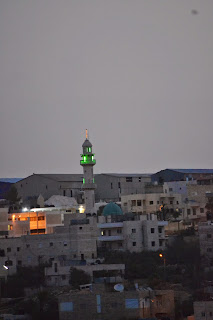Thursday, June 5, 2014
Traveling South into the wilderness
A beautiful day dawns in Bethlehem. This is the view from our balcony. We all met for breakfast to prepare for the day.
This was taken on the rooftop outside the hotel restaurant. The weather was very moderate. It was a beautiful day.
The Catholic Church of St. Nicholas was located right outside our hotel. We were actually staying in Beit Jala - one of the three cities (Bethlehem, Beit Jala, and Beit Sahour) that make up greater Bethlehem. In Bethlehem it is always Christmas!
Leaving Bethlehem, the graffiti on the security fence reminds us we are in the West Bank. There is a sense of sadness to see such divisions at the birthplace of Jesus. My heart breaks for the hatred and ill-will in such a sacred city.
I was able to snap this picture as we approached the check point leaving the West Bank. It is hard to reconcile the Savior of the World with this scene.
We we pass Bethany, home of Mary, Martha, and Lazarus. The name Bethany means "house of misery/poverty." Other translations call it "house of figs." It is located on the slope of the Mount of Olives. This was the city where Lazarus was raised from the dead, and where Jesus was anointed with perfumed oil at the home of Simon the Leper. It may even be the location of Jesus' ascension.
Here we begin our 4700' descent to the Dead Sea, the lowest point on earth. Our destination is the Fortress Masada. We are entering the wilderness.
As we traveled, we read Psalm 46:1-5. This is from the Common English Version:
God is our refuge and strength,
a help always near in times of great trouble.
That's why we won't be afraid
when the world falls apart,
when the mountains crumble
into the center of the sea,
when its waters roar and rage,
when the mountains shake
because of its surging wave.
There is a river whose streams
gladden God's city,
the holiest dwelling of the Most High.
God is in that city. It will never crumble.
God will help it when morning dawns.
We were asked to consider what it means to practice the spirituality of paying attention. What can we do to practice the power of curiosity?
Here we catch our first glimpse of the Dead Sea. 42 miles long, by 11 miles wide, it is home to fish or other wild life. The only living things that exist in its salty waters are 15 types of bacteria. Its water is 10 times more salty than the ocean. It is surrounded by sink holes. The mountains of Moab are on the other side.
This is the original high water mark of the Dead Sea. It has receded across the highway and is dropping at the rate of 1 meter per year, due to evaporation and diversion of the Jordan River for agricultural purposes.
The Wadi Kidron drains rain water all the way from Jerusalem to the Dead Sea. Several days after our visit the rains came, filling up the Wadi and washing out the highway on which we were traveling. We were lucky to be able to make the trip when we did.
Why are there so many rocks in Israel? Legend says that when God created rocks, he put them in bags and gave them to the angels to fly all around the world creating mountains. Unfortunately, all the bags broke over Israel! It really is one of the rockiest areas I've ever seen. It is amazing to see the farmers adapt to the difficult terrain.
We are getting closer to the Dead Sea. It's beauty rivals that of the Caribbean - though its beauty is only on the surface. Is there a lesson here?
This is the En gedi Spring of the Wild/Kid goat. This may be where David hid from Saul as described in 1 Samuel 23-24. David may even have traveled on to Masada.
What can we learn here in the wilderness? Dependence, strength, trust, community, determination? So many great and tragic events took place here. Will we emerge as better people from our journey through the wilderness?
Subscribe to:
Post Comments (Atom)















No comments:
Post a Comment